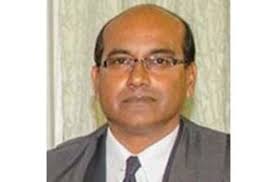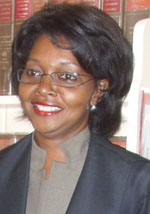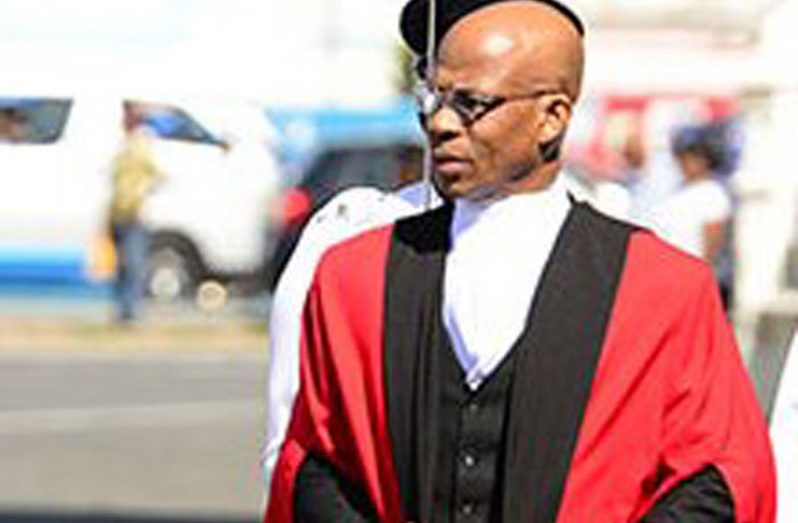…Court of Appeal hands down landmark ruling in ‘challenge to declaration of elections results’
…affirms that CEO must ascertain winner from valid votes cast
By Svetlana Marshall
IN a landmark ruling, on Monday, the Court of Appeal ordered that the words “more votes” in the Article 177 (2) (b) of the Constitution of Guyana be interpreted to mean “more valid votes” in determining the election of a President.

The order granted by the Appellate Court signals a significant win for Eslyn David – a North Sophia voter – who had challenged a decision of the Guyana Elections Commission (GECOM) to proceed with the compilation and submission of an Elections Report under Article 177 (2) (b) and Section 96 of the Representation of the People Act without first determining a “final credible count” as provided for in Order No. 60 and its addendum. David, through her battery of lawyers, had asked the Court of Appeal to interpret the words “more votes are cast” in Article 177 (2) (b) of the Constitution.
That section of the Article reads: “(2) Where – (b) there are two or more Presidential candidates, if more votes are cast in favour of the list in which a person is designated as Presidential candidate than in favour of any other list, that Presidential candidate shall be deemed to be elected as President and shall be so declared by the Chairman of the Elections Commission acting only in accordance with the advice of the Chief Elections Officer, after such advice has been tendered to the Elections Commission at a duly summoned meeting.”
In issuing the order, Justice of Appeal, Dawn Gregory, who led a panel of three judges, explained that Order No. 60 and its addendum had “sufficient force” to impact the interpretation of those words in Article 177 (2) (b) in relation the General and Regional Elections held on March 2, 2020. “To my mind, this court has the jurisdiction, in light of Order No. 60 of 2020, to interpret those words to mean ‘if more valid votes are cast,’” Justice Gregory said as she handed down her ruling.
Order No. 60, which was gazetted on May 4, 2020, and amended on May 29, 2020 was the legal cover used by GECOM under Article 162 of the Constitution and Section 22 of the Elections Law (Amendment) Act to facilitate a 33-day National Recount in its quest to determine a final credible count. Paragraph 14, in particular, ties the Elections Commission to declare the results of the General and Regional Elections based on a “final credible count.”
CEO’s report

But when the Chief Elections Officer (CEO), Keith Lowenfield, in a Report on the National Recount, indicated that more than 200,000 votes had been “tainted” due to widespread anomalies and cases of voter impersonation, the Elections Commission said it was outside of its jurisdiction to determine the credibility of the elections. As such, the CEO was instructed on June 16, 2020 to compile and submit an Elections Report, so as to pave way for the declaration of the Elections Result and ultimately the swearing in of the President.
Chairman of GECOM, Justice (Ret’d) Claudette Singh, through her Attorney Kim Kyte-Thomas, argued that Order No. 60 – a subsidiary legislation cannot supersede the Constitution – the Supreme Court of Law. But High Court Judge – Justice Brassington Reynolds, who formed part of the panel of judges at the Court of Appeal on Monday, drew attention to the fact that Justice Singh’s attorney admitted, during the hearing, that GECOM, under Order No. 60, had set as an objective to determine the credible count.
“Counsel for the second-named respondent admitted that GECOM did set as its objective, determining the final credible count of votes but by saying that it would be effectively a usurpation of the High Court’s function, after the fact of its inclusion in the very order which brought the recount into being, concedes an abdication of sort of the Commission’s responsibilities in that regard,” Justice Reynolds said.
The Judge said based on his examination of the affidavits and the exhibits tabled, it is pellucid that it was GECOM’s intention to determine a “final credible count.” The term “final credible count” was deployed twice in the Order, he said, while pointing out that it could be found in the third recital, at the beginning of the original order, and in the final paragraph of the amended order. “I conclude that the reasonable inference to be drawn from the inclusion of this formulation of words is that the Commission having defined it as an objective of the recount must have intended that those words be given effect to,” Justice Reynolds said.
He added: “Accordingly, I find that GECOM does have a responsibility to determine the final credible count of the results. It would be reasonable to presume that the final credible count would require both quantitative and qualitative assessments of reports and the summary of observations submitted to the Commission in compliance with Order No. 60 of 2020.”
On that basis, Justice Reynolds said that when Article 177 (2) (b) is considered together with Order No. 60, consideration ought to be given to the valid votes.
“It is thereby ordered that the words ‘more votes cast’ in Article 177 (2) (b) of the Constitution of the Cooperative Republic of Guyana, be interpreted to mean ‘more valid votes cast” within the meaning of Order No. 60 of 2020,” he ruled.

However, both Justice Reynolds and Justice Gregory agreed that the Appellate Court, in its narrow and special jurisdiction as laid out in Article 177 (4), could not grant the injunctive reliefs prayed for by David. In her application, David had sought an order restraining the Chief Elections Officer from submitting to the Elections Commission, an Elections Report under Section 96 of the Representation of the People Act, Chapter 1:03 containing votes which are not valid and credible but both judges agreed that it was not within the jurisdiction of the Appellate Court to grant such injunctive relief.
While Justice Reynolds and Justice Gregory ruled that the Court of Appeal had a narrow jurisdiction to hear the case and thereby interpret the Constitution in its Original Constitutional Jurisdiction conferred by Article 177(4), Justice of Appeal Rishi Persaud had ruled that the Court had no such jurisdiction, and as such, ruled that the orders and declaration sought could not have been granted.
David was represented by a battery of lawyers led by Trinidad and Tobago’s Senior Counsel, John Jeremie. Jeremie appeared in association with Trinidad’s Legal Counsel Keith Scotland, and Guyana’s Senior Counsel, Roysdale Forde, and Attorney-at-Law Mayo Robertson. The team had argued that Order No. 60 had changed the dynamics of the country’s electoral process, and as such the Guyana Elections Commission (GECOM) ought to determine the final credible count and or the credibility of the result of the General and Regional Elections, in accordance with the Order. Attorney-at-Law Kashir Khan, who represented Citizenship Initiative and Change Guyana – added respondents – asked the Appellate Court to stay the order on the interpretation of the Constitution for a period of three days. That stay was granted, and as such the order will take effect three days after the ruling.




.png)









